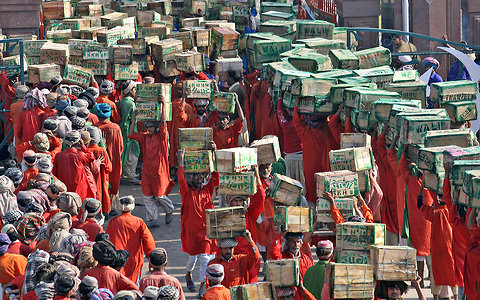Attari (Punjab):Trade and people-to-people ties between India and Pakistan takes on a new dimension with the Integrated Check Post (ICP) at the Attari-Wagah international border between the two countries to be formally inaugurated this week.
The ICP will see its soft launch Sunday – coinciding with the visit to India of President Asif Ali Zardari – with passengers using the ICP terminal for the first time to go across to Pakistan.
Home Minister P. Chidambaram is to formally inaugurate the ICP at Attari, 30 km from Amritsar, on April 13, which is Baisakhi day (harvest festival) in Punjab that heralds a new year.
“All equipment and facilities for customs, immigration and other things are being checked. The ICP will be formally inaugurated April 13 after the soft launch April 8,” said A.E. Ahmad, India’s secretary for border management.
Essentially aimed at improving trade between the two countries through the land border route, the ICP is expected to boost trade in the coming years. While India will have its ICP at Attari, Pakistan will have its own one at Wagah (in Pakistan).
The ICP inside Pakistan is likely to be inaugurated by Pakistan’s commerce minister and the (West) Punjab chief minister.
The ICP will have dedicated cargo and passenger terminals under one roof for the smooth transition of people and cargo from India to Pakistan.
“Trade with Pakistan could increase by a minimum of five times in the coming years. The Attari ICP has most modern facilities,” a customs official here said.
Built at a cost of nearly Rs.150 crore and spread over about 130 acres, the Attari ICP’s completion is one year behind schedule.
It was originally scheduled to be completed in April last year. This will be the first of the 13 ICPs that India is building along the international border with other countries.
However, officials here say the facilities at the Wagah ICP in Pakistan may not be able at present to match the ones in Attari in terms of technology, equipment and handling the volume of cargo and passengers. Pakistan has only two gates at its ICP and old warehouses.
Among other things, installation of truck scanners and drug scanners is being considered by the central government at the Attari ICP.
Though traders dealing with import and export to and from Pakistan are upbeat about the ICP project, they want the governments of both the countries to give another push so that trade between them could increase manifold.
“This is largely considered a quantum leap for India-Pakistan trade prospects, expected to increase from $2.5 billion to nearly $10 billion soon. Punjab, in particular, and north India in general are slated to benefit the most due to augmented infrastructure,” Gunbir Singh, a member of the Confederation of Indian Industry (CII) national council on public policy and former chairman of the CII Punjab state council, said here.
However, what has come as a dampener for traders is that the Pakistan government has still not allowed trade of items freely from the Attari-Wagah land route despite it being the cheapest and shortest trade route.
“On March 20, 2012, the government of Pakistan notified its much awaited Negative List, which opened up trade for an additional perhaps 5,000 items of trade. This was indeed a quantum jump from the less than 2,000 items which were earlier allowed to be imported from India. However, the rude shock is that out of these only 137 items can be imported through the Wagah road route,” Gunbir Singh pointed out.
While trade through trucks has been going on in a limited way for selected items, mostly perishables like vegetables and fruits, livestock, dry fruits, meat and poultry, since October 2007, the bulk of the trade between the two countries takes place via the Mumbai-Dubai-Karachi route which is very expensive and time-consuming.
“A lot needs to be done to make trade more effective through the Attari-Wagah route. The railway line (till Attari) needs to be integrated with the new ICP,” Amritsar-based trader Paramjit Singh said.
“Pakistan needs to expand the trade list to include many more things. Technology upgradation is needed so that time is not wasted in clearing goods. The authorities should also start thinking of using this route to extend trade with Afghanistan and Central Asian countries.”
IANS: Photo Courtesy: Arif Ali/AFP
The opinions, beliefs and viewpoints expressed by authors, news service providers on this page do not necessarily reflect the opinions, beliefs and viewpoints of Hill Post. Any views or opinions are not intended to malign any religion, ethnic group, club, organization, company, or individual.
Hill Post makes no representations as to the accuracy or completeness of any information on this site page.




